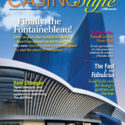
In this issue of Casino Design, our eighth annual review of the best in gaming architecture, construction and design, we feature the history and development of one of the most ambitious projects ever attempted in the gaming industry—heck, in all of the United States—MGM Resorts International’s CityCenter in Las Vegas. While all our previous issues highlighted spectacular projects, none ever reached the expense or the complexity of CityCenter.
When it was announced in 2004, it was going to be next generation of Las Vegas development. The “Manhattanization” of the Strip would begin with CityCenter and continue at many other sites, replacing the existing older resorts. Most of the major gaming companies had their own “citycenters” on the drawing boards.
But we all know what happened. The economy collapsed. Visitors to Las Vegas decreased dramatically. Room rates plummeted. The ambitious copycat developments disappeared. And companies teetered on the edge of bankruptcy.
One of those companies was MGM Resorts. Right in the middle of building the largest private development in U.S. history, MGM Resorts went through a financial crisis that would test even a company that didn’t take chances. But for one involved in not only the construction of CityCenter, but also in an ongoing mission to incorporate a large acquisition (Mandalay Resort Group) and international expansion (MGM Grand Macau and other non-gaming developments), this challenge must have seemed insurmountable. But MGM Resorts’s talented chairman and CEO, Jim Murren—who also, by the way, replaced longtime chairman Terry Lanni midway through the construction process—managed to put together financial packages that satisfied lenders and actually raised more money at a time when the fiscal pipeline was essentially frozen shut.
Upon this background we layer regrettable construction accidents, design mistakes and operational problems at other resorts, and it’s almost impossible to believe that Murren and CityCenter head Bobby Baldwin could marshal the will and the resources to bring the project home on time. But they did. And it is spectacular.
But some question the overall concept of “urbanization” in Las Vegas. Some say, for all its ambition and spectacular design, you could pick up CityCenter and plop it down in Los Angeles, Seattle or any city and it would not be out of place. And some say this is what makes it out of place in Las Vegas. In Las Vegas, the spectacular is the norm.
We often talk about the “wow factor” when we discuss casino design. From the volcano at the Mirage to the canopy of Fremont Street, Las Vegas visitors have been accustomed to seeing things they will never see in their hometowns. And while CityCenter is a spectacular example of modern architecture, urban planning and innovative business concepts, does it really fit what visitors expect of Las Vegas?
Perhaps CityCenter will do what MGM always said it was going to do: Create a new sophistication in Las Vegas. Draw a new clientele that would previously not consider visiting a gambling town. Bring together the entire community in a new “downtown” where people live, work, visit and play. And launch a new paradigm in the gaming industry against which every new project would be measured.
Obviously we can’t answer those questions today, less than a year after CityCenter opened. It might take five to 10 years to really grasp where CityCenter will stand amid the great resorts of Las Vegas.
But one thing is certain. For a company known for forward thinking, innovative designs and industry-leading ideas, CityCenter was a huge leap forward. Everyone involved in its conception, design and construction, from Jim Murren and Terry Lanni down to the day laborer and the maid, should be congratulated for taking a rather bold idea and transforming it into a living, breathing adventure.
For good design is nothing if it doesn’t take risks. Good design thrives on pushing the envelope. And good design sometimes takes time to mature and be recognized for what it is. MGM Resorts is to be admired for taking the steps to advance the casino design industry to new levels.







